Devon Trevarrow Flaherty's Blog, page 69
July 10, 2014
Movie Review: Girl Most Likely
 Time for another writer-related movie review: Girl Most Likely (2012; originally Imogene). This one came completely out of the blue. Despite always having my writer-related-movie-radar up, I had not heard anything about it. My husband just randomly picked it off of Netflix because it has Kristen Wiig in it. We were, then, pleasantly surprised. Now, I think the enjoyment of most mid-grade movies has a lot to do with prior conceptions, so I don’t want to talk it up TOO much, for fear of ruining your enjoyment. Just watch it, with no expectations. ;)
Time for another writer-related movie review: Girl Most Likely (2012; originally Imogene). This one came completely out of the blue. Despite always having my writer-related-movie-radar up, I had not heard anything about it. My husband just randomly picked it off of Netflix because it has Kristen Wiig in it. We were, then, pleasantly surprised. Now, I think the enjoyment of most mid-grade movies has a lot to do with prior conceptions, so I don’t want to talk it up TOO much, for fear of ruining your enjoyment. Just watch it, with no expectations. ;)
Here’s the concept of the movie: Imogene is an aspiring playwright who is finding it impossible to live up to her prestigious grant. In true comic fashion, everything comes crashing down in her life at the same time some of the right people (including a love interest) walk in.
The story, the acting, the cinematography, etc., I would give a “Sure, fine. I appreciated it.” But what put it over the top for me, to a recommend, is the laughs. And good, clean laughs at that. I found the costuming to be a bit off (her old 90s creations were too in style), Imogene’s bitterness is never fully dealt with, the title stinks, and I am always bothered when love=casual sex in movies. (I also think the timeline of her life might be a little off? So that they could cast a slightly older Wiig?) But I would watch it again. Wiig does a great job (as does every other actor in the entire film), but the best character by far is George Boosh (Matt Dillon). Yeah, you read that right.
As for how it relates to the writing life, I have two things to say. The fact that Wiig is a playwright is underplayed (pun!) in many areas, which I found refreshing. Sure, she’s a writer, but she’s also a person, a person with back-story, baggage, and complications that sometimes have little to nothing to do with her artistic personality. She sleeps and pees and resents her mother just like anybody else. Yet, the message is there, subtly; living up to a contract and/or career expectations is hard. Many of us writers have experienced the promise of our youth–all those “You should be a writer”s or “You’re so good!”s–which is now translating into a semi-disappointing (much slower and more difficult and less lucrative than expected) career. In the end, the message is pretty oversimplified. Just write! And yet, I give and use that advice all the time. The details are in what is happening in Wiig’s relationships and psyche, and that can be the place that we need to look to resolve our own career issues, including writer’s block.
See my article, My Meandering History as a Starving Artist, for more about responding to the authorial promise of your youth.


July 7, 2014
Book Review: Jane Eyre
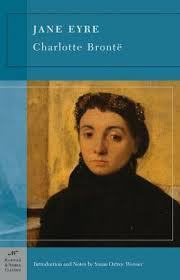 Jane Eyre, by Charlotte Bronte, published in 1847. I read the Barnes & Noble Classics edition, because it was given to me for free, but I did not read much of the front matter.
Jane Eyre, by Charlotte Bronte, published in 1847. I read the Barnes & Noble Classics edition, because it was given to me for free, but I did not read much of the front matter.
Jane Eyre is a Western classic, easily on any list of top 100 novels of all time. Part of what makes it intriguing, to me, is that it is one of the earlier books that give voice to a woman, and it is also one of the products of a trio of English sisters who each wrote books and poetry that would become extremely famous. Bronte did not live a long life, but after being a teacher and governess and producing a book of poetry with her sisters, Emily and Anne, published the semi-autobiographical Jane Eyre. She also published Shirley and Vilette, before dying at age 39.
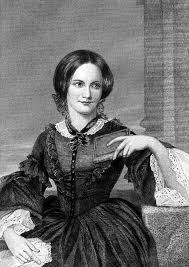 While fascinating, her life story is brief and pathetic. She was raised by a strict, Anglican pastor father and, when her mother and two eldest siblings died, her aunt. (Her eldest sisters had died while four of them were at a girls’ boarding school and they fell ill.) The Bronte sisters’ writing began with a box of toy soldiers, and they play-acted a land called Angria which they would write shorts about. Charlotte was known to be relatively ambitious and dominant, and returned home to the surviving sisters she missed, after a short career away. The sisters planned to start a school, but their advertisement did not solicit a single response. Instead, Bronte found Emily’s poetry and published a collection of the three sisters, under the names Currer, Acton, and Ellis Bell. Her first novel was rejected for publication. Bronte had long been a writer, then, when she published Jane Eyre at the age of 31 (the same year Emily published Wuthering Heights and Anne published Agnes Grey), under the masculine name Currer Bell. She published two more novels in the next few years. By then, her two sisters and her brother, Branwell (a drunk and drug addict), had died as well. Bronte had by then revealed herself as Currer Bell, and was drawn into the literary life and prominent circles. Bronte married Rev. Arthur Bell Nichols–a man she did not particularly love, but admired–and died a year later, during pregnancy. It is speculated that her bout of pneumonia was a way for her to die, and she took it rather than be cured. The Professor was published posthumously.
While fascinating, her life story is brief and pathetic. She was raised by a strict, Anglican pastor father and, when her mother and two eldest siblings died, her aunt. (Her eldest sisters had died while four of them were at a girls’ boarding school and they fell ill.) The Bronte sisters’ writing began with a box of toy soldiers, and they play-acted a land called Angria which they would write shorts about. Charlotte was known to be relatively ambitious and dominant, and returned home to the surviving sisters she missed, after a short career away. The sisters planned to start a school, but their advertisement did not solicit a single response. Instead, Bronte found Emily’s poetry and published a collection of the three sisters, under the names Currer, Acton, and Ellis Bell. Her first novel was rejected for publication. Bronte had long been a writer, then, when she published Jane Eyre at the age of 31 (the same year Emily published Wuthering Heights and Anne published Agnes Grey), under the masculine name Currer Bell. She published two more novels in the next few years. By then, her two sisters and her brother, Branwell (a drunk and drug addict), had died as well. Bronte had by then revealed herself as Currer Bell, and was drawn into the literary life and prominent circles. Bronte married Rev. Arthur Bell Nichols–a man she did not particularly love, but admired–and died a year later, during pregnancy. It is speculated that her bout of pneumonia was a way for her to die, and she took it rather than be cured. The Professor was published posthumously.
Jane Eyre is considered important beyond entertainment for two main reasons. First, it is the first of dramatically self-exploratory fiction which we now take for granted. Second, it was ahead of its time in its exploration of religion, proto-feminism, and classicism. Themes include home and family, love, maturity, passion, gender, social class, religion and morality. It is still a very popular book, and hundred of people have spent their careers and/or lives studying and enjoying it.
I enjoyed Jane Eyre, but not, perhaps, as much as I expected to. It isn’t a favorite, but I also would not object to a re-read at a later date. There were parts that were thrilling, and the prose is exacting, clean, and beautiful. However, the pacing in the second half is odd, I think, and I found the fourth section obnoxious. When I started watching one of the movie adaptations, I was hit by the brilliance of making the fourth section (when Eyre stays with the Riverses) the skeletal structure of the whole story, telling it from that point. That way, the Rivers don’t just pop out of nowhere and feel like a distraction to what we are already invested in. Alas, that’s not how it is, so the fourth section stays as it is. Unless you are making a movie.
Of course, I would recommend Jane Eyre, for anyone who likes (or can even stand) classic literature. It has a romantic bent, but the deeper sides of the story are also important and enjoyable. I am forever reluctant to see Eyre through the lens of modern feminism or atheism, but it is fascinating as an exploration of a female perspective on gender and class during the time period of the Brontes, as well as a thoughtful foray into the topics of passion and discipline, maturity and immaturity, and bitterness and forgiveness. There were times when I found the first person to be limiting and distracting, and other times when I thought it brilliant. Overall, I am glad to know Bronte was pioneering the style and intrigued by the endless exploration made possible by the fact that the whole story is told from only one perspective. I suppose that is why we have so many adaptations, and why The Wide Sargasso Sea exists. Where was Jane mistaken? Where was she blinded? What is it that she couldn’t see, that we can read into the narrative?
And a few more random observations: 1) Part of the appeal of Eyre is its combination of the different elements: coming-of-age, romance, mystery, etc., and its combination of dark and light tones. 2) In the flavor of a nineteen-year-old woman (although, I suppose the voice should be that of a thirty-year-old), the story gets overly dramatic and unrealistic, at times. My husband–watching one of the adaptions with the one eye that was not on his own Kindle–questioned a romance between a governess and a landed Lord. I would be more likely to complain of scenes like the one where Eyre runs away without a word or a penny (effectively) or a plan. But, like I said, she’s nineteen. 3) One of my favorite themes of the book is ambition. If you are looking for a book about ambition, this would be a good one for you. 4) Eyre seems to know herself too well. I think we get this impression partly from the first-person narrative style, but Bronte never really gives us obvious reasons to doubt Jane on any front. No one knows themselves, or others or their circumstances, that well. 5) As much as I do NOT normally have a problem with a successful, smooth jumping of narrative perspective, I found Eyre‘s random paragraphs in the present tense to be quite distracting and unsuccessful. I can see why she does it, but I don’t think it worked.
I will be reading The Wide Sargasso Sea–a popular novel based on the character of Bertha Mason–soon, as well as Bronte’s other works; The Professor, Shirley, and Vilette. I am also tempted to continue with her sisters and read Wuthering Heights, Agnes Grey, and Poems.
__________
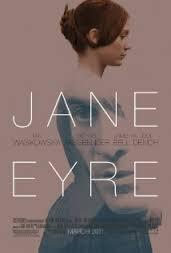 When faces with the many adaptations of Jane Eyre, I took the advice of The Enthusiast’s Guide to Jane Eyre Adaptations. I went with her top two recommendations.
When faces with the many adaptations of Jane Eyre, I took the advice of The Enthusiast’s Guide to Jane Eyre Adaptations. I went with her top two recommendations.
Jane Eyre (2011) was a good movie. Of course–as is often a problem–Jane and Mr. Rochester were too handsome for their roles, but other than that I have no real complaints. It stuck pretty close to the book, down to lines, and it put a face and costume and scenes to the characters and time period. It also introduced (to me) the idea of beginning with the fourth section and–although it did not carry the process all the way through–I thought this was a wonderful change. Recommend.
I am still watching the 1973 BBC miniseries of Jane Eyre, and will review it when I am done.
__________
Quotes:
“Vain favor; coming, like most other favors, long deferred and often wished for, too late!” (p27).
“‘It is far better to endure patiently a smart which nobody feels but yourself, than to commit a hasty action whose evil consequences will extend to all connected with you–and, besides, the Bible bids us return good for evil’” (p67).
“‘Why, then, should we ever sink overwhelmed with distress, when life is so soon over, and death is so certain an entrance to happiness–and glory?’” (p84).
“…suggested the thought that Hope traversed them at night, and left each morning brighter traces of her steps” (p91).
“…had courage to go forth into its expanse to seek real knowledge of life amid its perils” (p101).
“‘You will get on whether your relations notice you or not’” (p109).
“‘I am paving hell with energy’” (p165).
“It is as if I had a sting somewhere under my left ribs, tightly and inextricably knotted to a similar string situated in the corresponding quarter of your little frame. And if that boisterous channel and the hundred miles or so of land, come broad between us, I am afraid that cord of communion will be snapped; and then I’ve a nervous notion I would take to bleeding inwardly’” (p295).
“‘Of yourself, you could come, with soft flight, and nestle against my heart, if you would; seized against your will, you will elude the grasp like an essence; you will vanish ere I inhale your fragrance’” (p370).
“But next day, want came to me, pale and bare” (p377).
“‘He is a good and and a great man; but he forgets, pitilessly, the feelings and claims of little people, in pursuing his own large views’” (p481).
“‘All men of talent, whether they be men of feeling or not, whether they be zealots, or aspirants, or despots–provided only they be sincere–have their sublime moments, when they subdue and rule’” (p484).


July 3, 2014
Writing Prompted: Precision Grooves
The prompt for today’s flash fiction comes from The Write Practice, by Joe Bunting. I was supposed to write about–well, I won’t tell you exactly what or reading the story would be extra-boring–while not looking at what I was writing. Limit: 15 minutes. I threw a journal over the top of my laptop so I couldn’t see. (When I was done, I fixed the typos for you.) That means today’s short is not only flash fiction, it is impromptu flash fiction. Enjoy.
Precision Grooves
The bench was harder than I remembered it being, before. The grooves in the aluminum-like metal stood out to me, ran horizontal along the skin of my thighs and when I lifted them up on my toes, I traced the grooves in the skin with the tips of my fingers. It was probably not the thing to be doing at that moment, but it was distracting, for a minute or two, restful. Then the ticking of the clock–the kind of clock in a cage–caught my attention and in the moment after the moment in which I realized it was so quiet in the locker room I could hear the sound of a clock ticking, my stomach swooped downward toward my trainers. My stomach was ahead of my mind, by a millisecond. Then my mind joined my stomach, in that place where butterflies and nausea flitted across the basketball court along with squeaking sneakers and a waterfall of voices.
I didn’t have time to be thinking about waterfalls, or butterflies, or the neat, mathematical lines running across my muscular thighs where yes, even my thighs were soft enough to permit an expansion when I sat down. I used to think that fully toned legs wouldn’t allow for the squash outward of the sitting position. I was wrong. It was only in magazines that women had stick-like thighs when they reposed. Only after airbrushing. Only by tricks and teases. But before my mind could wander–oh, the relief!–to the Facebook article I had read last night about a girl who sent her photo to various fashion experts asking for a a Photoshop makeover and the eerie results, I stood up. Again, my body was a millisecond before my mind. I noticed in slight lag, that my body had swooped up, and didn’t wait to take a single breath before giving my locker a luck punch and pivoting toward the door, toward the clock in the cage, toward the stadium and the waterfall of voices.
One step, two step, Three. I counted when I was nervous, the way I did math upon waking from a stressful sleep. I couldn’t imagine the counting or the math semi-dreams helped, since in my right mind, I hated math. All except for the math of the game. The inertia of my body toward another player’s body, versus the elasticity of my muscles, versus the calcification of her bones. The height of a bounce relative to the inflation pressure of the ball. That intrigued me because it made me even better, took me even deeper into my affair with the game, into the experience of the game. All the time. Every place. Every inch of my slim, powerful body. Not powerful enough. There were moments of weakness, there were times when I buckled to a pain or a mindgame. When I lost the only battle that really mattered; the one about playing perfect within and of myself. This perfection was elusive. This perfection was, unattainable? We’d see. We’d see if I could beat it out of me, string it out of all that practice, that education, the repetition, the sweat and grunting and moaning and pushing and shoving. We’d see tonight, or we’d never.


June 30, 2014
Summer Writing
Last fall, when my youngest kid went off to kindergarten, I went full-time (six hours a day during school days) as a writer and publisher. The year turned into three novels at different stages of production: one is in the later stages of editing, and two are half-written. Now that summer break has arrived, I am forced to change things up a bit, and these are the two things most at the forefront of my work-mind:
Kids. On summer break. I am quite torn between being a super summer mom and fully enjoying my kids while I have them, and my goals and deadlines. When I plugged books into my production matrix months ago, I did not make any concessions for summer break. I simply didn’t want to. I wanted (and still want) to get all three novels out as soon as humanly possible for a basically one-man show and quality work. That was silly, not making concessions for summer break, and I am trying to throw on my writing brakes while also not guilting myself for doing my other–probably more important–job, well, in the space that I have been blessed with doing it. In other words, sacrificing those six-hour days back, for a couple months. Slow, even breathing. (That’s me hyperventilating over not barreling forward on imminent publications.) Actually, this makes sense for my particular situation, because holding down the home-front frees my nurse-husband up to take extra shifts, while I currently work for dreams and air. (But man do I work hard for it!)
Focus. I spent the whole year of 2012 exploring the concept of Focus and implementing it into my life and work. I seem, in 2014, to have allowed the concept of NaNoWriMo to drive a wedge between me and that ever-elusive Focus. With that 50,000 word goal dangling in front of me last November and this past April, I couldn’t see adding to a book, but just coming up with something brand-spanking-new. Last November, I finished a novella in 1 1/2 months, then this April, wrote half a book. However, there is something in me now regretting the path I chose, even though there is all this new material, and this interesting idea to use NaNoWriMo to add new projects to existing ones. The truth is, I’m not a good multi-tasker, and I like to see things finished. As writers, we can spin multiple plates forever, and I would not feel very happy or fulfilled.
So, after much deliberation, here are my changes:
1) A two-month sabbatical focused on our kids, our summer plans, our home projects, and transitioning everyone into new roles and schedules, once again. I have until August 31, 2014, to finish all important (read: functionality-involved) house projects and to re-charter a new and improved family schedule (read: has to be livable and meet basic demands).
2) Continued platform maintenance, because who would crash two years’ work for a summer off, right? So two blogs a week, Facebook and Twitter, writer group meetings, and Lit 101.
3) Re-write work deadlines and goals to reflect the sabbatical. (Push everything back two months.)
4) Re-write deadlines and goals to pour all efforts into one book at a time. (Sure, if I write a short story or poem on my own time, I won’t put myself in writer jail.) This includes NaNoWriMo, which I will only use to further current projects and not introduce new ones. Ouch, that hurts.
5) Quit anything else I can, once again, so I can be just a two-woman-woman: mom-wife-houseowner and writer-publisher. Oh the pain! It burns!
Life is, as the saying goes, a series of choices. I think that also means that life is a series of sacrifices. And, as they also say, to not make a decision is to make a decision. Well, I have made mine, and they may work out so well for me that I replicate them for years to come. I’m fairly certain they don’t stink. At the very least, they are well-intentioned, and we all know about good intentions…
Just kidding. You do what you have to do. I still get to do what I love, which is way better than most people get.


June 26, 2014
The Hard Way
Some of these lessons, you just can’t be “taught.”
The truth is, to be a good writer, and a good indie publisher, you have to have outside feedback, and then, miraculously, you have to know what to do with it. Because sometimes it’s not grammar or spelling or even A + B = C, but something so understated and new, you’re going to need all those writerly smarts just to figure it out.
Case in point: I am in the editing process of a fantasy novella called The Night of One Hundred Thieves. I am still hoping to publish in September, so I’ll try not to give too much away. But it’s like this: thirty-two people in a medieval, fictionalized town set their sights on stealing The Queen’s powerful, magical ring after she dies. Time after time, I received the exact same feedback: 1) characters needed a more conventional conclusion, 2) more magic! (and more closely defined magic), and 3) for pity’s sake, tell us what happened to the ring! We’ll talk about each of these.
As for the third, it especially baffled me, and I also had to laugh at it. (What else?) You see, the answer is in the book. There are–you count ‘em–three scenes where the ring shows up after being stolen (and a number of places where it doesn’t). I really don’t want to be too detailed here, but just believe me. There is sentence each time, and in that sentence it places the ring in that person’s possession. So what happened? Here’s what I learned from this process: 1) readers like to be hit over the head. As my writing group put it, Stop Being So Darned Oblique. Yeah, metaphor and description is great for showing us your prose chops, but readers still need things to be clear. Like crystal. 2) Readers like to be hit over the head even harder when the unexpected happens. They don’t want to stop reading and start thinking, “Did that really just happen?” No, they need to think, “That was crazy s***, but it totally just happened!” 3) When multiple characters have motivation and means, there has to be some sort of other muscle to flex to make the whole thing believable. This was especially hard on me, since one of the “points” of the story was that luck and randomness would have as much to do with a triumphing thief as anything. Although true to life, readers in general did not like this idea. They want to know why that’s the character who gets away with it. They want to know my justification for the ending. Like I have always said, the end needs to feel like an inevitable surprise. As a writer, I’m still working on what that means to the reader and how to orchestrate it. And 5) different strokes for different genres. This isn’t literary fiction, it’s fantasy.
My beta readers wanted more magic, and more closely defined magic. Here’s the thing: I can write for the most discerning and intelligent writer, but then I’m going to lose everyone else. This might sound pompous, but I often tell other writers not to take my opinions of their writing too serious because I am a very good reader. Most of their readers will not be as immersed in the world of literature as I am, or as attuned to the subtleties of story. Likewise, it’s not stupid to repeat things in real books, to come back around, to drive home a point, or to just say it.
My beta readers wanted a more conventional conclusion. Readers can only take so much of “different.” Short fantasy mixed with an insane number of characters and shifting point of view was already enough of a work-out for the reader. (Those things, they enjoyed.) But when they got to the end and found a more open-ended story line with loose tie-ups… they were not amused. I am going to come back to my friend’s old visual for this: when you do something good in a story, it’s like giving the reader a gold coin. When you challenge the reader, it’s like expecting them to pay you a gold coin (even if the challenge will be rewarding). By the time my readers got to the end, they were entertained but they were nearly bankrupt. I couldn’t pull a fast one on them when I had already required them to flex their cerebrum once every three pages, already. Of course, some books are structured to challenge, almost exclusively, but that’s not the audience I am going for here. So one last lesson: know which audience you are going for, and make sure you please them.
Sure, whatever you are going through, some writer somewhere has been through. However, it’s in the particulars that we can be blinded. I mean, I would have told you that my ending was clear and “surprising but inevitable.” Unfortunately, I would have been the only one. What I mean is, there are books and classes and books–and I have read a number of them–addressing plot and ending and genre and all the things I just wrote about. It’s that mysterious process of actually writing the book that’s inside you that makes following advice and using tools so darned tricky. I mean, every application is both unique and myopic, and so can be exceedingly bizarre and confusing. Thank goodness I believe that there is no perfect Platonic form of “book” or “my book” waiting to be actualized. I just rely on my intuition and my instincts and my talents, make sure the tools are handy, and embrace my beta readers and editors. I’ll never, ever see my own book for what it really is… I’m just too close to the thing. But I can do my best and wait to see if it has just a glimmer of the brilliance I’ve seen in my dreams of it.


June 23, 2014
Movie Review: Authors Anonymous
First things first: The Starving Artist has passed 100 posts and 800 followers! Also, we have passed one of the great, blog-tipping-points where–after a year and a half–the blog finally has its own momentum and we get actual comments (maybe some Shares, Tweets, Likes) on every post. Woo-hoo! Now, if I can only usher it wisely, and make sure to keep the good content rolling, I should be able to hold the blog above this threshold.
Now for a writing-related movie review. For once, the movie I am reviewing is not a great-book-into-movie, but a movie about writing. Unfortunately, it’s not a great one. For all the books about writers (probably too many, actually), there don’t seem to be nearly as many excellent or relevant movies about writers or the writing life. In fact, if you could make a superb fictional movie about a modern, self-pubbed writer, it would be timely, to say the least.
 Authors Anonymous has been dangling in front of me at the local RedBox, and despite the awful reviews, I couldn’t resist wasting my own time with a kombucha, jalapeno chips, and a couple hours of thoughtful tedium. (I was being thoughtful. The movie was being tedious.) I was reluctant to accept the consensus that we are living in a post-mockumentary world, but this movie sure made me feel someone, somewhere was right about that assessment. What I’m going to say is this: There are themes and particulars worth exploring here, and moments when writers everywhere, I’m sure, go “Yeah! I get that!” There is also a bit of a disconnect between LA authors and whatever I am… a Southern author. Mostly, though, the story is beyond slow and uninspiring, and it’s a downright groaner for its moments of ridiculous cliche. An author–who doesn’t read–gets snagged in the first chapters of her first book and before her book is even done is making six figures and sleeping with famous people. Whah?
Authors Anonymous has been dangling in front of me at the local RedBox, and despite the awful reviews, I couldn’t resist wasting my own time with a kombucha, jalapeno chips, and a couple hours of thoughtful tedium. (I was being thoughtful. The movie was being tedious.) I was reluctant to accept the consensus that we are living in a post-mockumentary world, but this movie sure made me feel someone, somewhere was right about that assessment. What I’m going to say is this: There are themes and particulars worth exploring here, and moments when writers everywhere, I’m sure, go “Yeah! I get that!” There is also a bit of a disconnect between LA authors and whatever I am… a Southern author. Mostly, though, the story is beyond slow and uninspiring, and it’s a downright groaner for its moments of ridiculous cliche. An author–who doesn’t read–gets snagged in the first chapters of her first book and before her book is even done is making six figures and sleeping with famous people. Whah?
Plus, why was it even called Authors Anonymous? Good idea, exploring the tension between a group of writers when one of them meets with the ever-elusive success. Bad, bad actualization. And even for all that, I would not discourage writers from watching, just for those (almost redeeming) moments of “Aha” and the message to put writing first and avoid distraction and to stop getting in your own way. I would never recommend it to anyone else, though, because I hate the idea of anyone thinking we writers are that polarized between spiteful nut-jobs and naive bumblers who only have but to finish that last page before fate graces our talent with laurels and fame and fortune.
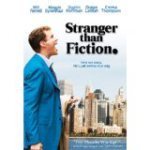 The best writing movie I know of at this time is Stranger Than Fiction, but that still does no better at portraying the life of a real writer. (It’s just a good movie.) If you can make a blockbuster portraying real childbirth and publishing, you’ll have my vote for an Oscar.
The best writing movie I know of at this time is Stranger Than Fiction, but that still does no better at portraying the life of a real writer. (It’s just a good movie.) If you can make a blockbuster portraying real childbirth and publishing, you’ll have my vote for an Oscar.
So, since I can’t recommend the reviewed movie for most of you, I’m going to give you a few summer movies to watch,  instead. At the movies: Maleficent. It was a bit slower than I expected, and the much-talked-up acting was understated. But beyond that, I have no complaints. Even though it was complex and dark, my kids enjoyed it as much as I did. One of us liked the fairy world and special effects, one of us liked the magical fight scenes and the dragon, the other of us liked the anti-bitter, anti-greed message of forgiveness. The end’s no shocker, and there are moments that are going to warrant an explanation for kids, but it’s a seamless summer movie full of power and beauty.
instead. At the movies: Maleficent. It was a bit slower than I expected, and the much-talked-up acting was understated. But beyond that, I have no complaints. Even though it was complex and dark, my kids enjoyed it as much as I did. One of us liked the fairy world and special effects, one of us liked the magical fight scenes and the dragon, the other of us liked the anti-bitter, anti-greed message of forgiveness. The end’s no shocker, and there are moments that are going to warrant an explanation for kids, but it’s a seamless summer movie full of power and beauty.

 On video: Mr. Peabody and Sherman and The Secret Life of Walter Mitty. Two very different movies, and yet they are both remakes and have the same light-hearted, almost-magical tone. I’m beginning to think movies of 2014 are slow by trend, because that’s the only real complaint I have of both of these, as well. But I would watch them again. And again. First off, I love the idea that someone made a movie about the place where a character goes when they are zoning out. That is my kind of movie! And Stiller manages to be so lovable and intriguing while also being a bit funny. As for Mr. Peabody, it’s not as good as The Croods, but it speaks to grown-ups as much as kids, is about time travel and history, and is a comfortable mix between poignant and funny. Plus–and this is so exciting to me!–the parent survives the film and asserts his authority and the child’s need to obey and trust. What?!? In an age of child-dominated cinema, I was so happy to see this. You could also go with an outdoor viewing of The LEGO Movie. That’s what we’re doing.
On video: Mr. Peabody and Sherman and The Secret Life of Walter Mitty. Two very different movies, and yet they are both remakes and have the same light-hearted, almost-magical tone. I’m beginning to think movies of 2014 are slow by trend, because that’s the only real complaint I have of both of these, as well. But I would watch them again. And again. First off, I love the idea that someone made a movie about the place where a character goes when they are zoning out. That is my kind of movie! And Stiller manages to be so lovable and intriguing while also being a bit funny. As for Mr. Peabody, it’s not as good as The Croods, but it speaks to grown-ups as much as kids, is about time travel and history, and is a comfortable mix between poignant and funny. Plus–and this is so exciting to me!–the parent survives the film and asserts his authority and the child’s need to obey and trust. What?!? In an age of child-dominated cinema, I was so happy to see this. You could also go with an outdoor viewing of The LEGO Movie. That’s what we’re doing.

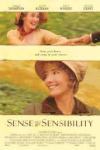
 On video for like twenty years: Try this (not official, but it should be) trio out for size, some long night full of down-time: The Remains of the Day, Sense & Sensibility, and Much Ado About Nothing. They are related by one particular actress–Emma Thompson–and also by England, period-film, and other common actors. They are also related by being particularly great movies. Oh, and they all also happen to be made from great books. If you haven’t had enough by the end, you could continue on with Downtown Abbey and/or Harry Potter, but that would be moving into a slightly different feel.
On video for like twenty years: Try this (not official, but it should be) trio out for size, some long night full of down-time: The Remains of the Day, Sense & Sensibility, and Much Ado About Nothing. They are related by one particular actress–Emma Thompson–and also by England, period-film, and other common actors. They are also related by being particularly great movies. Oh, and they all also happen to be made from great books. If you haven’t had enough by the end, you could continue on with Downtown Abbey and/or Harry Potter, but that would be moving into a slightly different feel.


June 19, 2014
Writer’s Blockade
I know that many of the people who follow my blog are not writers or publishers. I also know that, as a writer, I often get in a discussion (about being a writer) with people who have a very hard time understanding what I am talking about. This is because of the revolution you didn’t know was happening. And this blog is for you.
I’m going to try to break this down into the most surprising, simple, and basic points, because, let’s face it, I could go on all day about this stuff. You, on the other hand, want the short(er) version.
(Definitions: Self Published – one person conceives of, writes, edits, designs, produces, and prints a book. Some aspects, like editing, cover design, and printing, can be (and is often) hired out. Indie Published – same as self published, but a more modern term. It can also mean being published by a small, independent press, and that press may or may not be owned and operated by the author. Traditionally Published – the author is represented by an editor (and sometimes an agent) and paid by a (sometimes very large) publishing house that also edits, designs, markets, prints, and sells their book. Some (or all) rights are sold to the publishing house in a “book deal.”)
The publishing world is in complete flux, and has been for several years. And it will be still, for awhile. It started with a few things: the economic recession that pushed book purchasing to the back of the average American’s purchasing power; the advent of the e-book and popularity of the e-reader (like Kindle, iPad and Nook); and the invention and implementation of the POD. (“What’s a POD?” you ask. It stands for Print On Demand, and it means that when you order a POD book (which you have no idea is POD), it actually prints out the book for you after your order. It is used in everything from book vending machines (yes, they exist) to many purchases from Amazon and other major online retailers. Authors can also order copies of PODs to distribute themselves, at a relatively low cost.) What has resulted: a weary publishing world (aka. editors and agents taking on fewer projects, marketing on the decrease, small stores (and big ones, like Borders) out of business); a glut of material (meaning that there are now WAY more books available than there were only ten years ago); and a shifted point of success (from what used to be a “Hurray! I’m published!” to “Hurray! My book sales have finally broken out!” (which could be many years later)). Unfortunately, this has led to a decrease in average book quality, little to no ability to publish even promising manuscripts the traditional way, and a clamoring for attention and sales in the landslide of books. Some of the most exciting benefits of this are: better royalties for writers; a more informed and active writer (needing to be involved in all aspects of publishing); a fighting chance for truly talented and persistent writers; books that break the traditional publishing mold (like longer first novels or books about college kids); full control given to the author, including in choice of cover art, final edit power, movie rights, etc. Of course, all revolutions come with their battles and at a price, but I won’t bore you with all the intricacies of the power struggle. I’m sure you can imagine.
Self-publishing is not vanity presses. I suppose this is why many of us like to call it indie publishing. Self publishing is just not what it used to be, and indie authors are sick and tired of being saddled with the negative press surrounding the old way of doing it. Here’s another thing: self publishing is free. (Basically.) It didn’t used to be. The old impression was that if you self-published you were a failed writer, and that you had to fork out thousands of bucks to put your sorry copy between two covers and then hawk it to your friends. This is not the modern reality of self-publishing. Granted, indie/self-publishing lacks a filter like a major publishing house with its agents, editors, and markets, but two things: 1) there are many indie authors producing superior books and 2) traditional publishers don’t necessarily have the best record for premium books, either. Sure, I don’t like it that the glut of shoddy, rushed books give me a bad name, but the pros far outweigh the cons, and I predict that most readers already can’t tell the difference between a well-done self-published book and a “normal” one.
PODs and ebooks have opened up a whole new world for writers. Yes, I already touched on this, but let’s just say that–even while the economy was trenching the fields–it was these two technologies that turned the whole writing world onto its head. It meant that with only grit and time (and no money), a writer could publish. It meant that writers could circumvent the gauntlet of agent- and editor-seeking, a process which had become increasingly painful, hopeless (for many), and perhaps even outdated. Yes, you may pause to sing a line from Aladdin‘s “A Whole New World.”
Most authors must do their own marketing. And, surprise!, I don’t mean just indie published authors. Almost every author, even the traditionally published ones with a whole slew of editors and marketers behind them, must do their own marketing. Publishing houses don’t have the resources or the interest in putting themselves behind a vast majority of the books they produce, so even though you may snag a book deal, mid-list (and bottom-list) authors usually wane as quickly as they wax. Put another way: when brick and mortars (this means physical books stores) put your books on their shelves, they might give it a few weeks to sell like hotcakes before they sell it back to your distributor. That’s right. Your book is basically a consignment object. And really, most authors don’t even get that far. Without a big marketing campaign and with book sellers pushing only the top titles, your book probably never even made it through the front door. So indie authors aren’t more burdened this way, they are just more aware. Most authors these days are stuck with the onus (and the bill) of branding, publicizing, marketing, touring, and selling their own books.
Your local author is wearing about a hundred hats. As I just said, even traditionally published authors have to do a lot more than just write, these days. You can imagine, then, what it is like to be indie published. Here are a few of the responsibilities I have on a weekly basis (counting only my day job, of course): branding and platform building (which means keeping a constant web presence among other things); marketing and publicity (like scheduling virtual and live appearances, creating material and distributing it, blogging, guesting, keeping abreast of indie publishing news, etc.); writing (oh yeah, that); copyrighting and permissions; learning (which I largely do by near-constant reading and through writing-education material); editing and copy-editing; designing (everything from webpages and eflyers to book covers and interior); finances and bookkeeping; organizing and managing (like creating deadlines and standards); and networking. And you thought I was daydreaming and tapping at the keyboard all day.
Most books don’t sell well. I know you mean well when you ask how my books are selling, but my embarrassment partly springs from the fact that you can’t possibly know just how poorly most–and many incredible–books sell. And I do sincerely mean most. I’ll repeat it. Most books don’t sell well. Poor book sales are often less of a negative reflection of the quality of the book or even the marketing (although these need to be in place), but more of a combination between the aforementioned and time, quantity of books in the author’s catalog, and dumb luck.
Your reviews matter! I put this point in here not because you were asking, but simply because it is one of the things most authors would like to tell you, oh general public. Your reviews are one of the simplest and most amazing things you can do to help us succeed. If you like or–hallelujah, even love–a book, pretty please consider a review on Amazon, Barnes and Noble, Goodreads, Smashwords, Shelfari, etc. Likewise, sharing, liking, and commenting are truly important to our business.
Writing is taxing, necessary, and noble. Most successful authors are very hard-working, determined, persistent, and long-suffering. Most of the wimps get picked off early on. It is, both emotionally and financially, a grueling profession. Imagine working for little to no pay, having everyone in the world privy to your results, and then being publicly both praised and razed about it. It takes a lot of chutzpah to bare your work and soul in the public forum, and it takes lots of endurance to keep it going (thinking of things to write and willing yourself to do it with little to no oversight). On the other hand, writers often write because “they have to.” It is the way in which they confront and process the world, and many of them feel truly compelled to do it. Also, they are often rewarded in ways which are not financial. Most writers love their jobs as writers. Many writers aim not just at your entertainment, but also at enlightenment, relationship, connection, justice… for good and great and worthy things. They are some of the people who bring about change and betterment in the world, who open your minds to new ideas and the complexity of life in all its shades, who push the envelope, feed invention, and facilitate societal change. Their creative minds churn on, day and night, to observe, make sense of, and report, for you.
Most writers are walking a fine line between starving and selling out. It’s true. After all the hard knocks, the struggle, and the rewards, many of us are right there in the chasm between Rowling and whoever takes photos of cats clinging to precipices. We want to do our art, desperately, but we are waiting for the pie in the sky–the means and resources to do what we feel born to do. Many of us will not get there, but we also try, generally, not to elbow all the other contenders out of the way. Personally, I am a professional. I was created to write. I have to do about a million other things to get there. I have my hand on the throttle and its pushed all the way up in hopes that one day you will all discover me and give me that path into your lives that I have been working so hard to earn.


June 16, 2014
Author Review: Smashwords’ Mark Coker
Secrets of Ebook Publishing Success and Smashwords Book Marketing Guide, by Mark Coker. Both of these are free ebooks.
 Mark Coker is the founder and current head guy at Smashwords. He started Smashwords when he and his wife had written the book Boob Tube, but–despite obvious promise–could not get an editor interested enough to publish it. He is now very involved in indie-publishing promotion and education, the entire process of Smashwords (which has grown exponentially the last few years), with writing self-publishing books and PR books, and in speaking engagements.
Mark Coker is the founder and current head guy at Smashwords. He started Smashwords when he and his wife had written the book Boob Tube, but–despite obvious promise–could not get an editor interested enough to publish it. He is now very involved in indie-publishing promotion and education, the entire process of Smashwords (which has grown exponentially the last few years), with writing self-publishing books and PR books, and in speaking engagements.
So what is Smashwords? It seems that many of you would know what Smashwords is, by the sheer number of their customers, and yet I rarely if ever hear anyone reference it like they do Barnes and Noble or Amazon. Smashwords is an ebook “printer,” retailer, and distributor, probably the biggest and most active of its type. I used them in publishing the e-version of my first novel, Benevolent, and they act as my distributor to the likes of Barnes and Noble, iBook, Kobo, etc. To be completely honest, I have undervalued their services for the past year-and-a-half and viewed them primarily as a way to dole out free copies of my book for giveaways, but no longer. They are an extremely valuable distributor and promoter of indie books, and I plan to honor them and use them more than I have in the past. If you like ebooks, you should probably check them out. Just don’t mind the slightly clunky interface… concentrate on all the great books (and many for free).
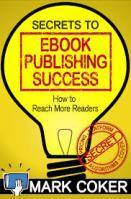 A few months ago, I ran aground of a copy of the free ebook, Secrets to Ebook Publishing Success. Since I value constant research into my field as part of my day job, I decided to insert this into my ever-growing list of TBRs. I was not disappointed. Now, it’s not exactly gripping prose, maybe more of a manual. And I was already aware of many things that it told me because, like I said, I do my homework. But there were some amazing golden nuggets of indie publishing in there. And it doesn’t just have to apply to ebooks in every circumstance (in other words, PODs as well). You can see my list of notes below, but I found this book illuminating and extremely useful. I would recommend it to all self-publishers. Nay, more than recommend; encourage.
A few months ago, I ran aground of a copy of the free ebook, Secrets to Ebook Publishing Success. Since I value constant research into my field as part of my day job, I decided to insert this into my ever-growing list of TBRs. I was not disappointed. Now, it’s not exactly gripping prose, maybe more of a manual. And I was already aware of many things that it told me because, like I said, I do my homework. But there were some amazing golden nuggets of indie publishing in there. And it doesn’t just have to apply to ebooks in every circumstance (in other words, PODs as well). You can see my list of notes below, but I found this book illuminating and extremely useful. I would recommend it to all self-publishers. Nay, more than recommend; encourage.
 The previous book mentioned the Smashwords Book Marketing Guide many times, and since that was free as well, I read straight into that one. It really is a manual, and most of the text is a list of forty-one free marketing tools. It was not nearly as riveting a read (for a publishing geek such as I), but I can’t overemphasize the practicality of those tips and Coker’s perspective. Again, I recommend for all self-publishers, even if you don’t think you are going to use Smashwords as a distributor.
The previous book mentioned the Smashwords Book Marketing Guide many times, and since that was free as well, I read straight into that one. It really is a manual, and most of the text is a list of forty-one free marketing tools. It was not nearly as riveting a read (for a publishing geek such as I), but I can’t overemphasize the practicality of those tips and Coker’s perspective. Again, I recommend for all self-publishers, even if you don’t think you are going to use Smashwords as a distributor.
__________
Somewhat random notes from Secrets of Ebook Publishing Success and Smashwords Book Marketing Guide:
My writing = creativity + intellect + talent + experience + sacrifice
Never stop working to earn every page turn.
Book descriptions don’t summarize the whole book, they tantalize the potential reader.
Jealously guard your time from inefficiency and distraction.
Invest your time, not food or shelter money.
Book retailing is basically a consignment business.
My Kindle royalties have halved since I published in 2013, because I refuse to give Kindle exclusivity.
Giving books away for free is a best-kept secret of best-selling authors.
Get to that deep backlist!
A publication date used to mean one foot in the grave, now it means the beginning of a journey. Practice the never-ending book launch.
Continue “rolling thunder” after the initial promotion.
Trust your customers and supply chain partners.
Remain positive, especially in your platform. In fact, project brand positivity.
If your ebook’s pirated, consider it low-cost publicity.
Ask yourself, “How can I make my book as easy as possible to discover, purchase, and enjoy?”
Spend money editing, not marketing.
Consider your beta readers as an aggregate.
Negatives affect your negatively, not neutrally.
Think permanent marketing infrastructure, like thousands of paths leading to your books.
It can be beneficial to publish a series all at once.
Full-length series perform best as ebooks.
Marketing should feed a strong desire + urgency. Readers want emotional engagement.
Switching a bestseller from indie to traditional publishing often results in a higher pricing and plummeting sales.
Most overnight indie successes labored away for years in obscurity.
Do the easy and quick thing first. Put your work into the 20% with the 80% of the returns.


June 13, 2014
Series Review: Ender Quartet
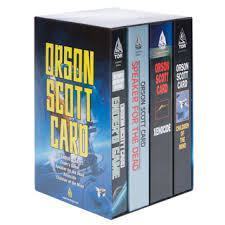 The Ender Quartet, by Orson Scott Card, which includes Ender’s Game, Speaker for the Dead, Xenocide, and Children of the Mind, and was published by Tor between 1985 and 1996. There are plenty of other series-related materials, which I did not read. I figured 1,668 pages was enough. In fact, 706 pages might have been enough.
The Ender Quartet, by Orson Scott Card, which includes Ender’s Game, Speaker for the Dead, Xenocide, and Children of the Mind, and was published by Tor between 1985 and 1996. There are plenty of other series-related materials, which I did not read. I figured 1,668 pages was enough. In fact, 706 pages might have been enough.
The Ender Quartet is just the central (and original) part of a large and webbed body of material referred to as Enderverse. The Enderverse includes the Ender Quartet, and then about a gazillion other books forming the Shadow Saga (expanding on more minor characters from the Ender Quartet) and books flushing out the history of Enderverse. The novel Ender in Exhile is sometimes listed as part of the Ender Quartet, making it the Ender Quintet. Although written later, it would fit as the second book in the Ender Quintet and ties it together with the Shadow Saga. Shadows Alive wraps up both sagas.
Ender Quintet:
Ender’s Game
Ender in Exhile
Speaker for the Dead
Xenocide
Children of the Mind
Shadow (or Bean) Saga (taking place parallel to the Ender Quintet):
Ender’s Shadow
Shadow of the Hegemon
Shadow Puppets
Shadow of the Giant
Shadows in Flight
Shadows Alive (wraps up both series)
Other Enderverse Books:
(prequel trilogy:) Earth Unaware
Earth Afire
Earth Awakens (coming out in five days, actually)
(second prequel trilogy, coming out after 2014:) The Swarm
The Hive
The Queens
A War of Gifts
First Meetings
A number of short stories
A new series of comics by Marvel (beginning in 2014)
The Authorized Ender Companion (which you are going to need after tackling a series like this)
If you are at all interested in reading the whole Verse in chronological order, check out the list here.
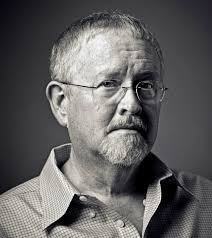 Now, if you think all Orson Scott Card writes is Ender, you would be wrong. He has ten other series, a miscellany of novels, many short stories, and is the compiler of various anthologies. Oh, plus he writes plays and nonfiction and collaborates on comics, video games, and screen. He is a novelist, critic, public speaker, essayist and columnist, best known for his science fiction, and specifically for Ender’s Game and Speaker for the Dead, which both won the Hugo Award and Nebula Award.
Now, if you think all Orson Scott Card writes is Ender, you would be wrong. He has ten other series, a miscellany of novels, many short stories, and is the compiler of various anthologies. Oh, plus he writes plays and nonfiction and collaborates on comics, video games, and screen. He is a novelist, critic, public speaker, essayist and columnist, best known for his science fiction, and specifically for Ender’s Game and Speaker for the Dead, which both won the Hugo Award and Nebula Award.
Card is an American author, born in the 50s, and a practicing Mormon and great-great-grandson of Brigham Young. He teaches at Southern Virginia University, and his passions include writing, teaching writing, and political, religious, and social commentary. He currently resides in Greensboro, North Carolina, an important location in his Enderverse.
His career as a writer started young with poetry and then theater writing. He then switched to the profession of editor and worked for the Church of Latter Day Saints. By 1977, he had published his first short story under a pseudonym. While writing mini-plays for LDS radio, he wrote and published the short story that was to become Ender’s Game, and when two more of his books received book deals, he left off editing for writing. Bouncing back and forth between writing and editing, Card received his Masters degree and was on his way to a PhD when the Alvin Maker Trilogy landed him another big book deal. Shortly after, he published the first two Ender books, won science fiction’s top two awards, twice, and achieved sci-fi fame and fortune. He has used at least seven different pseudonyms over the years.
Here are my reviews of each of the books in the Ender Quartet:
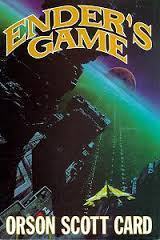 Ender’s Game. I have read this book before, when the announcement that a movie was in the making caused various people in my circles to explode with excitement. I asked, “What is this book that means this much to people?” and I read it. And I enjoyed it. And when I saw the movie, I decided to re-read it, read the rest of the Quartet, and review it. To put it plainly, Ender’s Game is just a really well-done science fiction novel with great twists and turns. It can be a little on the heavy side, and I am not thoroughly convinced that the characters’ ages are right (and I am not alone in this opinion). I would highly recommend this book for anyone, even those who have not read a lot of science fiction (like, let’s be honest, me). It is full of Card’s characteristic exploration of morals and psychology, but is also chock-full of surprises and innovation.
Ender’s Game. I have read this book before, when the announcement that a movie was in the making caused various people in my circles to explode with excitement. I asked, “What is this book that means this much to people?” and I read it. And I enjoyed it. And when I saw the movie, I decided to re-read it, read the rest of the Quartet, and review it. To put it plainly, Ender’s Game is just a really well-done science fiction novel with great twists and turns. It can be a little on the heavy side, and I am not thoroughly convinced that the characters’ ages are right (and I am not alone in this opinion). I would highly recommend this book for anyone, even those who have not read a lot of science fiction (like, let’s be honest, me). It is full of Card’s characteristic exploration of morals and psychology, but is also chock-full of surprises and innovation.
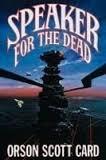 Speaker for the Dead. I was really frustrated when I started this book and it was so completely different from Ender’s Game. I felt lost. But as I continued, it grew on me, and it’s a pretty incredible book on its own. It gets too slow and preachy at the end, but up until then it is intriguing and riveting. I also kept wondering what happened with one of the characters, but I guess it was resolved at the end. You also start to notice just how unrefined Card’s writing is by the time you get to more lengthy passages, but we’ll talk about this in a sec. Also recommend this book.
Speaker for the Dead. I was really frustrated when I started this book and it was so completely different from Ender’s Game. I felt lost. But as I continued, it grew on me, and it’s a pretty incredible book on its own. It gets too slow and preachy at the end, but up until then it is intriguing and riveting. I also kept wondering what happened with one of the characters, but I guess it was resolved at the end. You also start to notice just how unrefined Card’s writing is by the time you get to more lengthy passages, but we’ll talk about this in a sec. Also recommend this book.
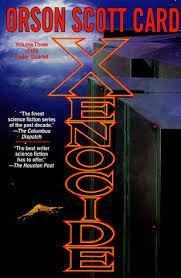 Xenocide. It is amazing to me that the writer for the first two books of the Quartet is still the writer for the third. I found myself wondering if his editors stopped editing or if he stopped listening to their advice. (Upon researching Card, I wondered if his astonishing output is the reason for quick editing and for a lack of refinement.) While full of his fascinating science fiction stuff and moral dilemmas galore, this book is not only HEAVY on religion, but also SLOW and even frequently boring. It’s super wordy, taking pages to do something that should be done in a paragraph, and there is lots and lots of telling-not-showing (especially about character feelings). Some of the old characters even go sour on us (right from page one). In the end, I found myself enjoying some of his characteristic twists, but thought that he should have just stuck with the characters on Path and left the Speaker characters in the background, like he did between the last two books. Not highly recommended, although if I were a big science fiction fan, I might be tempted to mine the Enderverse for more gems.
Xenocide. It is amazing to me that the writer for the first two books of the Quartet is still the writer for the third. I found myself wondering if his editors stopped editing or if he stopped listening to their advice. (Upon researching Card, I wondered if his astonishing output is the reason for quick editing and for a lack of refinement.) While full of his fascinating science fiction stuff and moral dilemmas galore, this book is not only HEAVY on religion, but also SLOW and even frequently boring. It’s super wordy, taking pages to do something that should be done in a paragraph, and there is lots and lots of telling-not-showing (especially about character feelings). Some of the old characters even go sour on us (right from page one). In the end, I found myself enjoying some of his characteristic twists, but thought that he should have just stuck with the characters on Path and left the Speaker characters in the background, like he did between the last two books. Not highly recommended, although if I were a big science fiction fan, I might be tempted to mine the Enderverse for more gems.
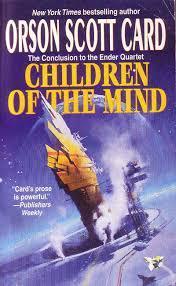 Children of the Mind. Sounding like a broken record here, but this one still has great twists and turns and some real quotables, and still I find I am getting sick of Card’s repetitive, long-winded, and flat prose. I am only hanging on for the next big shock. Also, does anyone else have issues with the negative-positive characters (like Novinha and the Queen), dropped characters, and bizarre pacing? Same feelings as for the last book. What got me through was the couple of romances, at the end. Thinking that the first two books are all that’s best about his Enderverse.
Children of the Mind. Sounding like a broken record here, but this one still has great twists and turns and some real quotables, and still I find I am getting sick of Card’s repetitive, long-winded, and flat prose. I am only hanging on for the next big shock. Also, does anyone else have issues with the negative-positive characters (like Novinha and the Queen), dropped characters, and bizarre pacing? Same feelings as for the last book. What got me through was the couple of romances, at the end. Thinking that the first two books are all that’s best about his Enderverse.
Overall, like I told my husband, there’s nothing about the language in the Ender Quartet that could take my breath away, the way I like good literary fiction. But there was also nothing to distract from the story (except maybe the long-winded thing). So no bad writing, either, except I would have advised him to cut, cut, cut (after the first book), without cutting his moments of sage-like insight. I’m not a big science fiction reader, and I really enjoyed this weird mix of science fiction/psychology/anthropology/academics/philosophy/religion. It’s something else.
_____
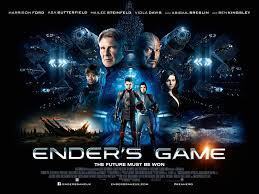 I had just seen the movie before the reading. I thought they did a pretty good job with it. It was perhaps a little heavy and violent for my six-year-old, but otherwise, a real decent adaptation. And it was adapted, of course, changed here and there, but also remained quite true to the story. Decently casted. Decently acted. Decent effects. Etc. etc.
I had just seen the movie before the reading. I thought they did a pretty good job with it. It was perhaps a little heavy and violent for my six-year-old, but otherwise, a real decent adaptation. And it was adapted, of course, changed here and there, but also remained quite true to the story. Decently casted. Decently acted. Decent effects. Etc. etc.


June 11, 2014
Writing Prompted: Pinned Up
Since I’ve been writing more shorts lately, I’ve decided to share some of them with the Starving Artist Blog and see how what the response is. Following is some flash fiction written in one sitting, inspired by a writing prompt from the book I am currently reading.
Pinned Up
A micro fiction story from a writing prompt,
by Devon Trevarrow Flaherty
He beckoned to me to follow him, with a hand encapsulated in a greasy, surgical glove. I had never seen mechanics wear latex gloves and I wanted to ask him, “Is that the thing, nowadays? I wanted to tell him, “My father never wore latex gloves, and I can’t imagine he does, now.” No, his hands were always man’s hands: stubby and olive, greasy and callused, al the outlines of fingernail and wrinkle drawn in permanent black, like a cartoon.
But I didn’t ask, I just followed a man whose name I didn’t know toward a four car garage, open at all four doors to a summer’s day. It was earthy out here, even in a strip mall, which is the South for you. Blue and gray skies, and flourishing saplings thrive in their beds of pinestraw and pre-withered grass, permeating the air with moisture, dirt, and honeysuckle. Then that smell died, the wide sky obliterated by the weeping of gasoline and oil onto the ground, the insistent hammering of an air drill jetting past the point of a bolt’s full tension.
The temperature dropped too–encased in all the smooth cement and brick–and the floor became barely navigable around wheeled oil pans, power cords, and discarded tires. I didn’t look for the tool and dye calendars or pinups. Instead, I inhaled the coolness and fumes with a bit of stale some and thought–for just a moment–I’m a kid again.
My Taurus was on the ground, looking vulnerable and ashamed with its hood wide open to expose its black and chrome guts. And the man–a sort of pseudo-mechanic, I feared–immediately pointed to to the battery and its oily nodules. Pointed before he even came to a standing rest. Pointed to show me either where I might find car batteries and their nodules or else in shame. This is why your car’s still back here, lady. This is why we’re holding you hostage until we lick the insides of your pockets clean. He jimmied the connection to the battery and, well there it was, wobbly so that even a lady could see it.
Ah, I see. That’s not what I thought. What I thought was more in tune with Where’s my daddy? and it felt like the offspring between an empty stomach and the great heaviness of the last $100 in my purse. I was keenly aware of my bank balance, my kids waiting for me curbside at school, my family out of town, my husband untouchable at work. So keen, so weighty, in fact, that I wondered what friends I could call before settiling into a reserved sigh that almost–but couldn’t–end in me telling this babbling pseudo-mechanic about my hopelessness.
And there it was: the pinup I hadn’t looked for, accusing me from her twerked position over a lipstick red Corvette. I lingered too long in looking at it. There we go. That’s home.





